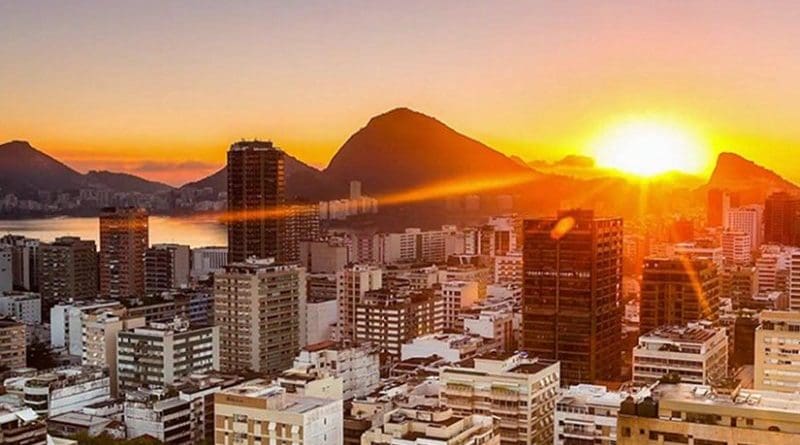The Not So Beautiful Game: The Corruption That Dogs The Olympics – OpEd
Every four years, the International Olympic Committee approves three provisional sports to compete for permanent inclusion in future games. It seems that one of the latest candidates is the sport of attacking host countries before their Olympic Stadiums are even completed. In what can only be seen as good news for FIFA, the sporting body most used to being caught in the international community’s opprobrious glare as its rampant abuses come to light, the spotlight has shifted onto the greatest international sporting tournament on earth – the Olympics.
Russia could easily claim the gold for its spectacular mishandling of the Sochi Olympics, which included everything from rumors of bribes that it had paid out to win the bid away from Austria, to shoddy construction standards and allegations that Putin’s cronies cremed off the most lucrative contracts. And the string of controversies didn’t end there, but made a comeback earlier this year when clear evidence of industrial scale athlete doping was revealed to the New York Times by Grigory Rodchenkov, the director of Russia’s anti-doping laboratory during the Sochi Olympics. The official alleged that Russian antidoping experts working with members of the intelligence services swapped dirty urine samples for clean ones in the dead of night in order to ensure the eligibility of Russian athletes. Getting one over its international rivals at all levels, and by means foul or fair, appeared to be the Russian rationale throughout.
Brazil, the host of the upcoming 2016 Rio games has faced many problems, mostly of its own making. In late June, the acting governor of the State of Rio de Janeiro complained to Brazilian newspaper O Globo that his state had not yet been furnished with the federal funds it requires in order to ramp up security for the competition, saying “I am optimistic about the games, but I have to show the reality. We can make a great Olympics, but if some steps are not taken, it can be a big failure.” The financial problems the Games is causing for Brazil are already well-documented, as is the fact that poor Rio inhabitants are being forcibly pushed aside to make way for the Games. What Brazil could never have accounted for, however, is the devastatingly Zika crisis, which is prompting tourists and athletes alike to pull out of the tournament.
If, however, the IOC thinks that it can just try and get through the Rio Games and then sit tight and wait for happier times, it can think again. The 2018 Winter Games in South Korea are already tinged by controversy, beginning with a collective cringe as South Korea’s president, Lee Myung-Bak pardoned chairman of Samsung and IOC member Lee Kun-Hee for tax evasion, making it quite clear that he hoped this kindness could be returned when it came to assessing his nation’s Olympics bid. With the bid now confirmed, the team is already facing resignations of key players and even more corruption allegations.
And it doesn’t end there. Already, there are already rumors that the Tokyo 2020 games has already been permeated with corruption, with French police investigating an alleged payment from the Tokyo Olympic bid team to an account linked to the son of former world athletics chief and IOC member Lamine Diack that was believed to have been made during Japan’s bid to host the 2020 games.
According to Japanese authorities, the seemingly suspicious payment is entirely innocent, merely a legitimate payment made based on the earnings of a consultancy company. Japanese Olympic Committee President, Tsunekazu Takeda, explained that the transactions between his team and the consultancy firm Black Tidings involved “legitimate procedures” throughout and were declared by the bid committee, audited by an external organization and reported to the IOC itself. Hiring a consultancy firm to bolster an Olympic bid is, the Japanese assert, entirely standard practice. Why then, have the French seized upon this chance to stoke up a furor?
Sadly, there are rumors circulating here too. For some, France’s eagerness to demonstrate its zealousness in stamping out corruption is motivated entirely by self-interest and political opportunism. Paris is itself bidding for the 2024 games, and rather like a school child fervently stretching his hand aloft in his eagerness to show that he, not his classmates, has the right answers, France is trying to differentiate itself from its competitors by branding itself as the ‘anti-corruption’ choice – even if that means pointing out corruption where there is none and further besmirching the reputation of the event in the process.
When it comes to corruption, it seems like the Olympics, like the proverbial snake, will eat itself. Even those seemingly trying to stamp out corruption are suspected of having thoroughly corrupt reasons for doing so. The only way to manage this string of scandals, and to try to re-establish the integrity and international integrity of the Games is for the IOC to take a very firm position. Recognizing the need to claw back at least a veneer of respectability, the International Olympics Committee (IOC) has banned direct payments to members of the IOC and has officially recognized the signing of contracts between host countries, lobby groups, and consultants. But it’s obvious that the reforms weren’t nearly as effective as were billed. Only complete transparency from all those involved can help save the Olympics now.
*Alicia Conway is currently undertaking a Master’s in Economics and Management in London

